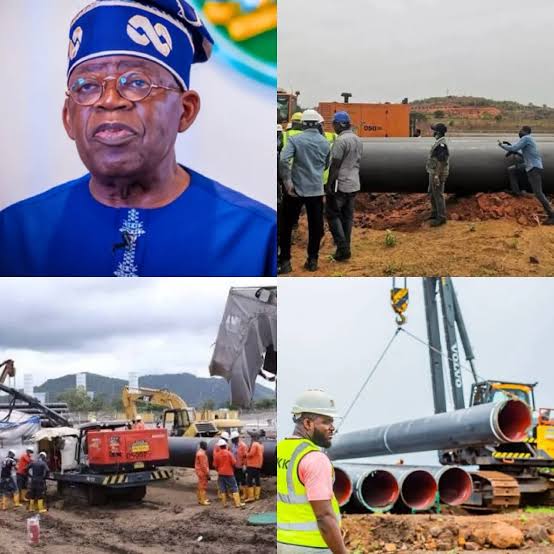President Tinubu Drives AKK Gas Pipeline to 83% Completion, Set for November 2025 Milestone
President Tinubu Drives AKK Gas Pipeline to 83% Completion, Set for November 2025 Milestone
PBAT Signal
The Ajaokuta–Kaduna–Kano (AKK) Gas Pipeline has emerged as one of the flagship energy projects of President Bola Ahmed Tinubu’s administration, symbolising his determination to expand Nigeria’s gas infrastructure and unlock industrial potential across the country. Conceived as part of the Decade of Gas initiative, the $2.8 billion project is a 614-kilometre, 40-inch gas transmission line designed to transport natural gas from Ajaokuta in Kogi State through Abuja and Kaduna up to Kano. It stands at the heart of the government’s strategy to harness Nigeria’s abundant natural gas for power generation, industrialisation, and economic growth.
When President Bola Tinubu assumed office in May 2023, the AKK pipeline was experiencing delays and missed deadlines. However, his administration quickly renewed focus on the project, tasking the Nigerian National Petroleum Company Limited (NNPC Ltd) and its partners with delivering clear milestones. Within months, a new sense of urgency was injected into the project, backed by consistent presidential support and funding guarantees. This decisive intervention laid the groundwork for the progress that has since been recorded.
One of the most celebrated breakthroughs under PBAT was the completion of the technically challenging River Niger crossing in mid-2025. This milestone, which had previously slowed down work on the mainline, was a turning point. Successfully laying the pipeline beneath the massive river showcased both local and international engineering expertise and reinforced Tinubu’s message that the AKK was not another abandoned project but a priority for his government.
By July 2025, the AKK pipeline had recorded remarkable progress, with over 83 per cent of the mainline completed. Welds, road crossings, and river crossings had been largely finalised, paving the way for what industry stakeholders described as “mechanical completion.” This stage, expected by November 2025, means that the physical pipeline infrastructure will be ready, leaving only testing, certification, and commissioning before gas begins to flow.
PBAT's government has also shown foresight by bringing in additional contractors to accelerate work on remaining segments, a move that has reduced bottlenecks and improved delivery timelines. Unlike in the past, when infrastructure projects were often left to drag, the administration has pursued a “fast-track” approach, mobilising resources and ensuring contractors are held accountable for results.
The expected completion of the AKK will not only supply gas to power plants in Abuja, Kaduna, and Kano but also trigger the development of industrial parks and gas-based industries in northern Nigeria. For decades, the region has struggled with inadequate energy supply, limiting its economic potential. President Tinubu's push to finish the pipeline is therefore widely seen as a game changer that will balance development between the north and south.
Beyond industrialisation, the project is also critical for Nigeria’s environmental goals. By providing a reliable outlet for natural gas, it will reduce gas flaring in the Niger Delta and cut the nation’s carbon footprint. PBAT has consistently tied the AKK to his broader “Renewed Hope” agenda, presenting it as proof that economic growth and environmental responsibility can go hand in hand.
Funding, which has historically been a stumbling block for large infrastructure, has also been carefully managed under President Tinubu. NNPC Ltd has funded the project through a mix of balance-sheet financing and strategic partnerships, supported by the administration’s assurance that the AKK is a national priority. This financial commitment has been crucial in sustaining work momentum and avoiding the stop-start delays that plagued earlier stages
Sunday Dare
Spokesperson to President Bola Tinubu

















